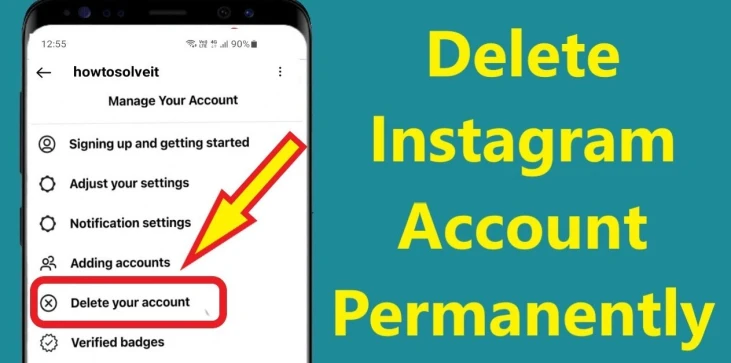
As a seasoned content creator and digital citizen, I've often contemplated the influence social media has on our lives. The decision to delete an Instagram account is not one to be taken lightly. It's a definitive step towards reclaiming time, ensuring privacy, and sometimes, a necessary action for mental health. I've seen friends and colleagues struggle with the adverse effects of prolonged exposure to the platform's comparative nature. For me, it's about taking control of my digital footprint and ensuring my online presence aligns with my personal values. Instagram, once a simple photo-sharing app, has evolved into a complex social network that intertwines with our daily lives. From the moment we wake up to the time we go to bed, many of us are guilty of incessantly scrolling through our feeds, absorbing a barrage of curated images, stories, and Reels. This habitual engagement often leads to hours lost, privacy concerns, and a skewed perception of reality. Deleting my Instagram account became a liberating choice, one that I've never regretted. In this article, I will guide you through the process of how to delete an Instagram account. But first, it's important to understand the implications of this action and how it differs from simply deactivating your account. Let's explore the mechanics behind these options and why you might choose one over the other.
Before we delve into how to delete an Instagram account, it's crucial to distinguish between deactivation and deletion. Both actions serve different purposes and have varying consequences. Deactivating your Instagram account is a temporary measure. It allows you to hide your profile, photos, comments, and likes without permanently erasing your data. This option is ideal if you want to take a break from the platform without committing to a full departure.
On the other hand, deleting your Instagram account is an irreversible process. Once you decide to delete your account, all of your content, including photos, videos, comments, and followers, will be permanently removed. You won’t be able to retrieve any of the information once the process is complete. It's a fresh start, a way to wipe the slate clean, but it comes with the price of losing your digital memories and connections.
Understanding these differences is pivotal as they cater to different needs and outcomes. If you're unsure about leaving Instagram for good, deactivating could be a sensible first step. However, for those determined to remove their presence completely, deletion is the only way to go.
For those looking to step back temporarily, learning how to deactivate Instagram is a straightforward process. Here's a step-by-step guide to help you temporarily disable your account:
Log into your Instagram account via a web browser. Instagram does not allow you to deactivate your account from the app.
Navigate to your profile by clicking on the profile icon in the top right corner.
Select 'Edit Profile' next to your username.
Scroll down and click on 'Temporarily disable my account' at the bottom right.
Instagram will ask you to select a reason for deactivating your account. Choose the option that best reflects your decision.
Re-enter your password to confirm your identity.
Click on 'Temporarily Disable Account.'
Your account will now be hidden until you choose to reactivate it by logging back in. Remember, during this time, your profile and content are invisible to other users, but not deleted.
The decision to learn how to delete an Instagram account permanently is often driven by a desire for a clean break. There are several reasons why one might opt for this. Privacy concerns rank high on the list; with data breaches and the sale of personal information, leaving the platform can feel like regaining a sense of security. For others, it's about mental health; the pressure to maintain an 'Instagram-worthy' life can take a toll on well-being.
Moreover, time management is another factor. Instagram can be a time sink, and by removing the app, you may discover hours in the day you never knew you had. Additionally, professional or personal reputation management can necessitate such a drastic step, especially if the content on the platform no longer represents who you are or aspire to be.
As someone who has gone through this process, I can attest to the sense of freedom it brings. It's a declaration of independence from the constant need for validation and a move towards living a life that isn't dictated by likes, comments, and follows.
If you're certain about your decision to leave Instagram behind for good, here's a comprehensive guide on how to delete an Instagram account:
Log into your Instagram account via a web browser. Account deletion cannot be done through the app.
Visit the 'Delete Your Account' page on Instagram's website.
When prompted, choose a reason for deleting your account from the dropdown menu.
Re-enter your password to verify your intention to delete your account.
Click on the 'Permanently delete my account' button.
Once you complete these steps, your account, along with all its content, will be scheduled for deletion and will be irretrievable after 30 days. It's a decisive move that leaves no room for second thoughts, so be sure you're ready to say goodbye before you begin this process.
Before you take the plunge and delete your Instagram account, there are several considerations to keep in mind. First, think about the content you've shared over the years. Do you want to save any of the photos or videos? Instagram offers an option to download your data before account deletion.
You should also consider the impact on your online community. Deleting your account means losing touch with followers and those you follow. If you've used Instagram for business or networking, this could mean cutting off a valuable communication channel.
Reflect on the potential repercussions of disappearing from the platform. If you have a significant following, your absence may be noticed and could require an explanation. It's worth communicating your intentions to close contacts or followers before going ahead with the deletion.

If you're hesitant to completely remove your presence from Instagram, there are alternatives to consider. Adjusting your privacy settings to limit who can see your posts, or taking a hiatus by deactivating your account, can provide a respite without permanent consequences.
Another option is to curate your feed and who you follow. This can transform your Instagram experience, making it more enjoyable and less overwhelming. Unfollowing accounts that don't add value to your life or that trigger negative emotions can be incredibly liberating.
Lastly, you could use Instagram more mindfully. Set specific times for checking the app and stick to them, or use features designed to remind you when you've spent a certain amount of time on the platform. These strategies allow you to stay connected without feeling consumed by social media.
When it comes to how to delete an Instagram account, numerous questions arise. Can I reactivate my account after deletion? No, once deleted, an Instagram account can't be recovered. How long do I have to change my mind? You have 30 days before the account is permanently removed. What happens to my messages and shared content? All will be erased and cannot be retrieved post-deletion.
Another common query is whether someone else can use my username after I delete my account. The answer is potentially yes, although Instagram may keep the username from being used immediately or at all. If you're worried about impersonation, consider changing your username before deletion.
Understanding these FAQs can help you make an informed decision and prepare you for the outcome of deleting your Instagram account.
Staying off Instagram after account deletion can be challenging, especially if you've been an active user for years. To resist the temptation to return, I recommend redirecting the time and energy you spent on the app towards new or neglected hobbies. Engaging in activities that promote wellness, such as exercise, reading, or meditation, can be both fulfilling and beneficial for your mental health.
Another tip is to maintain connections with friends and loved ones through alternative means. Consider regular calls, texts, or emails to stay in touch without the need for social media. This can lead to more meaningful and personal interactions.
Lastly, remind yourself of the reasons you deleted your account in the first place. Whether it was for privacy, mental health, or time management, keeping these motivations in mind can help you stay committed to your decision.
In conclusion, learning how to delete an Instagram account is a powerful step towards asserting control over your online presence. It can lead to a more intentional and less distracted life. The process may seem daunting, but with the steps outlined in this article, you can navigate it with ease.
Whether you choose to deactivate temporarily or delete permanently, the key is to make a choice that aligns with your personal goals and well-being. Social media is a tool, and like any tool, its impact is determined by how we use it.
Deleting your Instagram account is not the end—it's a new beginning, a chance to redefine your digital legacy on your own terms. Take control of your online narrative and embrace the freedom that comes with it.
Permanently deleting your Instagram account can provide a sense of liberation from social media pressures and privacy concerns. It allows you to reclaim control over your digital footprint and prioritize your online presence.
Unfortunately, once you've permanently deleted your Instagram account, it cannot be recovered. Ensure you've backed up any important data or content before proceeding with deletion.
Permanently deleting your Instagram account is a straightforward process. Visit the account deletion page on Instagram's website, log in, follow the provided instructions, and confirm your decision. Remember, this action is irreversible, so proceed with caution.